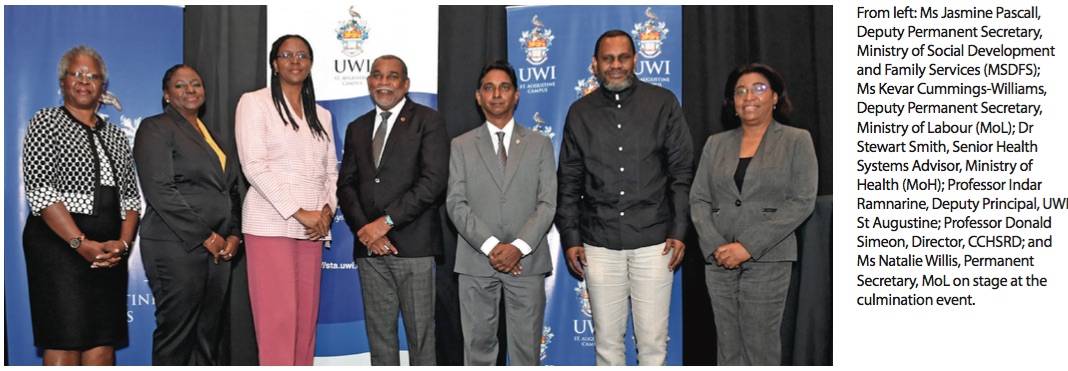The Caribbean Centre for Health Systems Research and Development (CCHSRD) recently completed a project that aimed to strengthen the capacity of four social sector ministries to use research evidence in policymaking and decision-making. The project activities included a needs assessment exercise, training and coaching sessions, as well as the co-production of knowledge translation (KT) documents to address important policy issues affecting the social protection system in Trinidad and Tobago.

Funded by the Canadian International Research and Development Centre, the Partnership for Evidence and Equity in Responsive Social Systems (PEERSS) was a multinational endeavour with 13 participating countries from Africa, Asia, Europe, the Middle East, Latin America and the Caribbean. CCHRSD was the only participating organisation from the Caribbean region.
Four government ministries participated in the project – Ministry of Labour, Ministry of Social Development and Family Services, Ministry of Planning and Development, and Ministry of Sport and Community Development.
“Prior to the PEERSS project, our partners, collaborators, and stakeholders had generally been within the health sector. This project afforded us the opportunity to work with ministries in the social sector to using appropriate mechanisms to build conducive environments for advancing evidence-informed policymaking, with a focus on Sustainable Development Goals,” said Ms Shelly- Ann Hunte, PEERSS, TT Co-Team Lead and a Research Fellow at CCHSRD.
The project, she explained, was innovative:
“We had the opportunity to pilot methods from the ‘health systems approach’ to determine how well they could be adopted or adapted in the social sector to promote evidence-informed policymaking/decision-making. That was one of the main objectives of the project. Another objective was to identify ways in which stakeholders and citizens could be included in the deliberative process.”
Hunte said that PEERSS, TT can have a meaningful influence on decision-making making locally:
“With policies and programmes that are grounded in evidence, we are more likely to achieve impact and get better value for the money. And, if we have policies and programmes that include citizens and stakeholders in the conversation, then they’re more likely to have buy-in, and implementation would be significant and stronger.”
A key outcome of the project was the KT documents. KT is a process of increasing the systematic and transparent use of research evidence in policy- and decision-making to improve outcomes. The KT documents produced by the various ministries focused on issues such as labour gaps in the public service, intervention strategies in education and social services, and sustainable community development.
Another innovation used in the training sessions was joint-learning sessions where the facilitators allowed participants to be actively involved in determining ways in which the proposed approaches and methods could work within their respective ministries. Additionally, the ministries identified commonalities and differences in their policymaking processes, policy priorities and the availability of research.
One participant from the Ministry of Sport and Community Development said he would be applying the skills learned to his daily duties:
“I think that this workshop has been very beneficial because, a lot of the time, we as public servants are called upon to create programmes at a very rapid pace to meet the needs of the citizens of the nation, and learning how to get the evidence to make the programmes effective is really important.”
He added, “I think this workshop really broadened my horizons in terms of the types of research that could be applied to public policy. In my background, I did comparative analysis, and from this workshop, I’ve learned that there is so much more. I look forward to applying what I’ve learned, and I do hope that in the future this kind of dialogue of experience is going to be allowed to continue.”
CCHSRD is committed to advancing the use of the best available evidence in policymaking in both the health and social sectors and looks forward to maintaining partnerships with government ministries as they seek to institutionalise evidence-informed policymaking and decision-making.